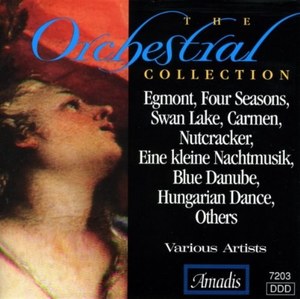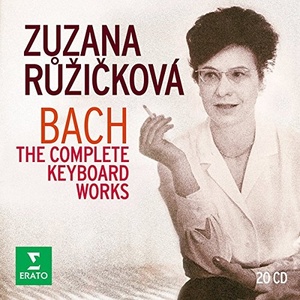Под заказ
A musician of searching intellect, generous spirit and formidable purpose, Zuzana Růžičková is one of the 20th century’s most influential harpsichordists. Central to her career, the music of Bach also helped her to transcend with grace the extraordinary adversity she faced during World War II and the Communist era. “There is something above us, near to us, which makes absolute sense, but we don’t see it. Bach tells you: ‘Don’t despair, there is a sense in life and in the world.’” [80]
Zuzana Růžičková, who turns 90 on January 14th is one of the most influential harpsichordists of her time. The Bach recordings she made for Erato between 1965 and 1975, now released in a 15-CD box set, are central to her achievement.
Like her contemporaries Ralph Kirkpatrick (1911-1984) and Gustav Leonhardt (1928-2012), Růžičková was a major force in reviving the harpsichord’s fortunes in the latter half of the 20th century, but she is also an extraordinary witness to the history of Europe, in particular to the evolution of her Czech homeland, and to the transformative power of music.
Zuzana Růžičková was born in 1927 in Czechoslavakia into a well-to-do Jewish family. Her musical talent became apparent at an early age. In the late 1930s she was planning to go to France to study with the pioneering harpischordist Wanda Landowska, but everything changed for her when the Nazis invaded Czechoslovakia in 1938 and she was unable to leave the country. World War II brought a series of terrible ordeals for her. In 1942 she and her family were sent to the Theresienstadt (Terezín) ghetto/labour camp, where her father and grandparents died, but she and her mother went on to survive Auschwitz, forced labour in Hamburg and Bergen-Belsen, where they spent the final days of the War.
After the War, music helped her to rebuild her life. Once she had recovered her health, she returned to her studies and decided to specialise in music of the pre-Classical era. Today she quotes her father’s words: “Don’t hate. Hate is something that poisons your soul,” and she adds, “To live with music is really a wonderful blessing.”
Her international breakthrough came in 1956 when she won the ARD International Music Competition in Munich and was given a scholarship to study in Paris with Marguerite Roesgen-Champion. While remaining a citizen of Czechoslovakia, where she endured the difficulties and deprivations associated with life under Communism, she made a distinguished international career, receiving many awards and honours. Her interests and influence extended well outside the world of pre-Classical music: she was married to the distinguished Czech composer Viktor Kalabis (1923-2006) and her musical partners included such figures as the conductor Václav Neumann, the violinist Josef Suk and the cellists János Starker and Pierre Fournier. In 1989, during Czechoslovakia’s so-called Velvet Revolution, she participated in protests against the Communist regime. Since the restoration of democracy she has continued to live and teach in Prague.
One of her pupils is the dynamic young harpischordistt Mahan Esfahani, who has curated this box set with the team at Erato. “It is my immense honour to have this opportunity to introduce Warner Classics' re-issue of Zuzana Růžičková's recordings of the Complete Keyboard Works of J.S. Bach, a massive project (21 LPs!) which she undertook for Erato in the 1960s and 1970s,” he says. “For me, Professor Růžičková is ‘Mrs. Bach’, the harpsichordist who took the message of Bach's art throughout the world and to listeners of all nationalities. She has seen great upheaval and change in her own life, and brings to this art a message of peace and a conviction in the universality of Bach's music. More than anyone, she has taught me how to be an artist and I am delighted that we are celebrating her legacy.”
These recordings have been newly and fully re-mastered in 24BIT - 96kHz from the original master-tapes. On hearing the remastered versions, Mahan Esfahani said: “I’ve been listening to Zuzana Růžičková’s recordings all my life, but this remastering was a revelation: her playing has never sounded so lifelike before.”
In addition to the complete works for solo keyboard – including such landmarks as the Goldberg Variations, Well-Tempered Clavier, English Suites and French Suites – the box features: the Brandenburg Concerto No 5 and the Concerto for flute, violin, harpsichord in A minor (with Jean-Pierre Rampal, Josef Suk & the Prague Soloists under Eduard Fischer), the sonatas for violin and keyboard (with Josef Suk), and the sonatas for cello and keyboard (with Pierre Fournier). Throughout the set, Růžičková’s strong musical personality is in evidence: she takes a searching, expressive approach to the score, unafraid of being eclectic and subjective as she strives to capture its essence, and maintaining a rhythmic flexibility within the pulse of the music. In 1971, Gramophone, reviewing her recording of The Well-Tempered Clavier, wrote of “her generous response to the music and its variety of character.”
She remains grateful to Bach, who, as she explains “played a big role in my recovering from my terrible experiences. He starts with a fugue, and a fugue is something above human suffering … It’s about order. You always feel in his music that God is present somehow. [As we go about our lives] there is something above us, near to us, which makes absolute sense, but we don’t see it. That’s what Bach is about. He tells you: ‘Don’t despair, there is a sense in life and in the world.’”
Хит продаж


